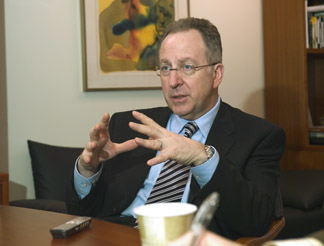Looking ahead to 'learning and listening' about the humanities
By Linda Grace-Kobas

While "a crazy mix" might serve as a good description of his juggling of affairs on two campuses, President-elect David Skorton also uses the phrase to describe his reading for pleasure. He likes spy novels and has read much of John le Carré. He reads a lot of nonfiction and is currently delving into Middle Eastern history, politics and education in the Islamic world. He tries to keep up with The Economist. And both he and his wife, Robin Davisson, are perusing Carol Kammen's lauded history of Cornell, "Glorious to View."
Skorton's obvious pleasure in talking about books during an interview on April 5 emphasized his reputation as a leading supporter of the arts and humanities. His 2004 declaration of the "Year of the Arts and Humanities" at the University of Iowa gave him particular visibility in that role. He is a member (with Provost Biddy Martin) of a national steering committee formed by the Association of American Universities and the American Council of Learned Societies, charged with initiating and developing strategies to examine the role and status of the humanities.
So how does he plan to enhance the arts and humanities at Cornell?
"It's early for me to predict exactly what form that would take," he said. "I'm going to be in a learning and listening mode in this regard. We not only have wonderful faculty and strong leaders in our colleges here, but we are graced by Biddy Martin, who is a very effective leader and a very accomplished humanist herself. So the first person I've turned to for advice is her."
He added, "I imagine the learning I will do by listening to the faculty in those fields will inform exactly what actions will be taken. But it's predictable I think that actions would have to include recognition and support. It's really too soon to tell exactly what form those actions will take. If you look at the things we did at Iowa -- the arts and humanities initiative -- you'll get a sense of the sorts of things I've done in the past. Past behavior is the best predictor of future behavior."
He sees the humanities as integral to Cornell's land-grant mission.
"The land-grant mission is based on the concept or the precept that we are here to serve not only the students on our campus but everyone in our community -- however you want to define community," he said. Noting that Cornell emphasizes its global mission, he said, "Anything that we believe to be of value in education, in continuing learning, should be of value to all the constituents whom we serve. The arts and other aspects of the disciplines that make us fully human are just as important for people off this campus as they are for people on this campus. The cultural outreach that the university provides is a very important form of outreach.
"That kind of cultural outreach of the arts in particular is such a prevalent aspect of university campuses nationwide, and I think that it's important that we devote resources, effort and care to the cultural outreach that we provide," he added.
Skorton advocates an activist approach: "Part of our mission is to raise and wave the banner and celebrate the importance of higher education, not only for those of us who are privileged enough to be on this campus but for those whose lives could be affected by all the wonderful things we do. So I think that's a very important part of our mission.
"Every research university in the country, whether or not originally a land-grant university, has that responsibility because we all get so much public money," he added. "We get hundreds of millions of dollars in external funding, predominantly from the federal taxpayers; we get very precious support from the state of New York, and we get support from alums and friends and the students and their families. So we owe a giving back in all the disciplines we have on campus."
In her preface to "Glorious to View," Kammen writes, "A university is ... a state of mind." David Skorton seems to be very much in a Cornell state of mind.
Media Contact
Get Cornell news delivered right to your inbox.
Subscribe